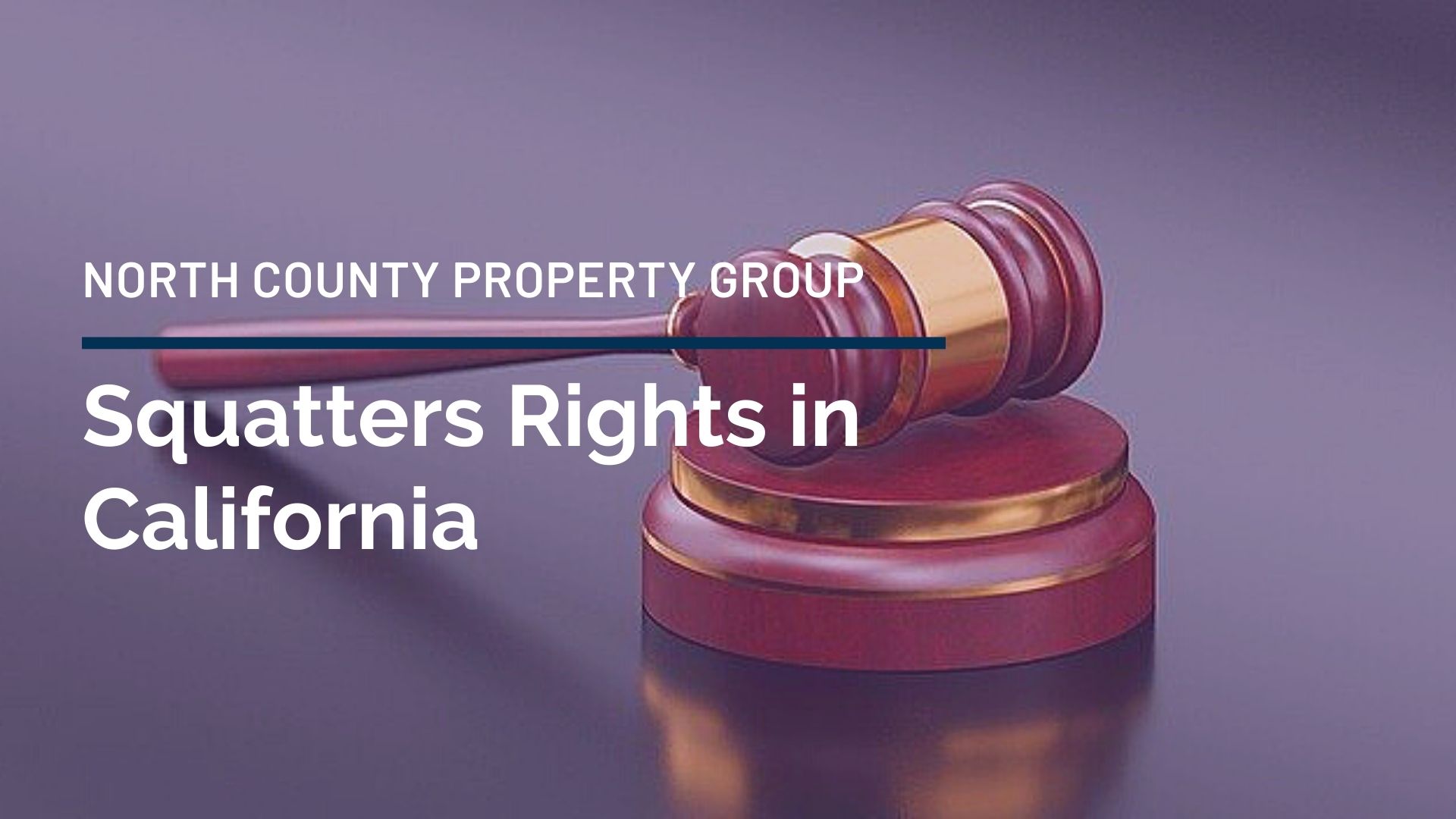On a recent episode of the Property Management Brainstorm Podcast, North County Property Group's Bob Preston spoke with Niv Davidovich—Managing Partner at Davidovich/Stein Law Group—to discuss landlord/tenant law, eviction law, and squatters rights in the age of COVID-19.
One of the main areas of risk when it comes to property management is the possibility of having someone living illegally on your property. So how can California landlords deal effectively and legally with squatters? And how do the new laws affect evictions in California?
This blog will give an overview of the new laws California property owners should be aware of. Keep in mind that this discussion is particular to the state of California and that it doesn't constitute legal advice. If you're looking for specific legal advice for your rental properties, get in touch with a legal expert.
An Overview of Squatting and Evictions in California
What is the Definition of a Squatter
A squatter is the last thing a property owner wants. Squatters don't pay a landlord for property and land, the true property owner often being unaware of the situation.
Squatters fall under their own category in California law. Squatters take residence in a property that they generally perceive to not have apparent ownership, this discrediting the label of trespassing. Squatters may pay property taxes on the property and land they believe is abandoned, these property taxes ultimately falling into their favor when it comes to adverse possession laws.
Adverse possession basically means squatters in California may gain the legal rights to owning the property after enough time has passed. There are laws in place to facilitate this transition of property ownership to a squatter.
As Davidovich explains, a person who had a right to stay in a residence via a lease, but then stays beyond the specified date may not be considered a squatter by the law. In this situation, they may be considered a "tenant at sufferance" rather than a squatter.

A tenant at sufferance generally has the same rights that any other tenant would have. Tenants with a lease cannot be evicted as long as they pay their rent, abide by the obligations of the lease, and don't cause a nuisance or do illegal things. They have a right to stay there if they're an official renter.
However, once a tenant's lease period—generally 12 months—expires, they lose their right to stay there. But in this situation they' typically wouldn't be considered a squatter—they're a tenant in sufferance.
If property owners want to evict tenants in this circumstance, they're entitled to 60 days of notice before you can begin the eviction process.
Davidovich says when he thinks of a squatter, he thinks of a person who has basically taken up residence in a residential premise with absolutely no permission from the property owner.
What is "Just Cause"?
The Tenant Protection Act of 2019—known as AB 1482—contains a concept known as "Just Cause," which restricts evictions.
According to Davidovich, AB 1482 was the law passed in California that essentially created California statewide rent control. This applies to all apartment buildings or multi-family buildings more than 15 years old.
This law stipulates that property owners cannot evict tenants unless you have "Just Cause" and there's is a long list of what counts as Just Cause.
When is a Tenant Eviction Necessary?
As Niv Davidovich explains, there are a few basic circumstances in which landlords have the right to evict tenants in California. The main three are described in Code of Civil Procedure 1161 (2), (3), and (4). Let's take a look at what sets these three justifications apart.

1161 (2) a very simple situation in which a tenant doesn't pay their rent. According to Davidovich, even before the global COVID-19 pandemic, the vast majority of evictions that he dealt with were from the simple situation of a renter not paying on time.
Next, 1161 (3) is what's known as a cure or quit. That means that a renter is kind of is violating some provision of their lease other than paying the rent. Examples of this would be if tenants were to have more people in their unit than allowed to, or changed the locks without giving you a key.
If tenants have an obligation to pay the utilities and don't, that would be 1161 (3). Another 1161(3) issue that most people don't know about arises if tenants fail to pay late fees.
1161 (4) is special because it is not a "Pay or Quit" or a "Cure or Quit" scenario. When it comes to 1161 (4) violations, tenants are not given the opportunity to remedy the situation. It's just a notice to quit. There are limited circumstances in which 1161 (4)s can be served, with one of them being nuisance-related issues.
Davidovich says most of the time an 1161 (4) is served when tenants are being unruly. Other instances that require an 1161 (4) include the illegal assignment or sublet of a lease, or waste.
Davidovich says waste is virtually never used in the San Diego area since it means these tenants have done something to the rental property that has caused a permanent loss of value.
What About in the Case of Illegal Activity?
Illegal activity generally falls within the definition of 1161 (4). For example, in the unfortunate circumstance that a renter is selling drugs on your rental property is an illegal use of the property.
However, as Davidovich explains, if a renter is using drugs in your property but not selling them out of the property, it's questionable whether you can evict that person, because your rental property itself is not part of the illegal act. You can see how this can easily become a legal grey area.

Another example would be if one of your tenants was caught cheating on their taxes. Davidovich explains that while this is against the law, for tenants to be served with an 1161 (4) notice, their violation has to be something that is particular to the premises.
How Should Eviction Notices Be Served?
In the case of residential rental property evictions, most tenants are provided with are three-day notices. However, if your lease stipulates that longer notice than that must be given, then you have to abide by what's in your lease.
An important aspect of the law that recently changed in California is that the required amount of notice for eviction is now three business days. Days that fall on weekends or holidays aren't counted.

Once three business days have elapsed, if the inhabitant hasn't left the premises—if they haven't cured the breach, if they haven't paid the rent, whatever it is—then that would be the first day that you could file the unlawful detainer. The terms "unlawful detainer" and "eviction" are synonymous.
Davidovich explains that an unlawful detainer is a lawsuit. While some landlords think they can simply go to the courts and get an eviction paper, it doesn't work that way in California. The notice is a mandatory prerequisite.
Once you've given notice and the required amount of time has passed, you have to go to the next step of filing the unlawful detainer with the court. Then you can serve this notice to the tenants in question. And they then have five court days to file some sort of response.
Squatter Rights in California: Final Thoughts
Typically when people think of squatters, they are envisioning a situation in which a person has sneakily taken possession of your property. The squatter began living there without permission. An adverse possession claim is another nightmare scenario for property owners, an adverse possession claim meaning the squatters is granted legal ownership of the property after enough time has passed. Squatters and the laws that protect them can be, in brief, a major headache for property owners.
However, there are plenty of situations in which someone could be living in your property without your full permission or knowledge: such as an illegal sublet, additional residents who don't appear on the lease, and tenants overstaying their lease period, perhaps without even knowingly doing so.
You can see why it's important to have a team on your side that is well-versed in the laws that govern landlords and tenants in the San Diego area. If you're a property owner looking for help with any aspect of your rental property in the San Diego area, get in touch with the expert team at North County Property Group.











